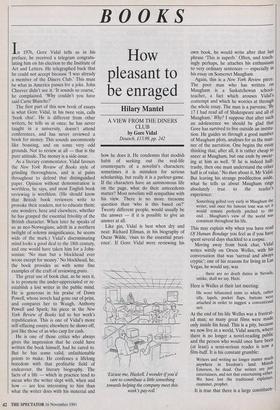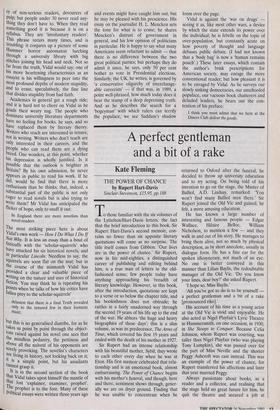BOOKS
In 1976, Gore Vidal tells us in his preface, he received a telegram congratu- lating him on his election to the Institute of Art and Letters. He telegraphed back that he could not accept because 'I was already a member of the Diners Club.' This must be what in America passes for a joke. John Cheever didn't see it. 'It sounds so coarse,' he complained. 'Why couldn't you have said Carte Blanche?'
The first part of this new book of essays is what Gore Vidal, in his twee vein, calls 'book chat'. He is different from other writers, he tells us at once; he has never taught in a university, doesn't attend conferences, and has never reviewed a book for money. This sounds uncommonly like boasting, and on some very odd grounds. Not to review at all — that is the pure attitude. The money is a side-issue.
As a literary commentator, Vidal favours the New York Review of Books style of grinding thoroughness, and is at pains throughout to defend that distinguished paper. Opinion without demonstration is worthless, he says, and most English book reviewing is worthless. (He should know that British book reviewers write to provoke their readers, not to educate them; one wonders, here and elsewhere, whether he has grasped the essential frivolity of the British character. When later he speaks of us as neo-Norwegians, adrift in a northern twilight of solemn insignificance, he seems wide of the mark.) Vidal's discriminating mind looks a good deal to the 18th century, and one would have taken him for a John- sonian: 'No man but a blockhead ever wrote except for money.' No blockhead, he; the book provides us with some fine examples of the craft of reviewing gratis.
The great use of book chat, as he sees it, is to promote the under-appreciated or re- establish a lost writer in the public mind. He is generous in his praise of Dawn Powell, whose novels had gone out of print, and compares her to Waugh, Anthony Powell. and Spark; his piece in the New York Review of Books led to her work's republication. This is one of Vidal's more self-effacing essays; elsewhere he shows off, just like those of us who carp for cash.
He is one of those critics who always gives the impression that he could have written the book himself, had he cared to. But he has some valid, unfashionable points to make. He confesses a lifelong boredom with that profitable field of endeavour, the literary biography. The facts of a life — which in practice tend to mean who the writer slept with, when and how — are less interesting to him than what the writer does with his material and
How pleasant to be enraged
Hilary Mantel
A VIEW FROM THE DINERS CLUB by Gore Vidal Deutsch, £13.99, pp. 242 how he does it. He condemns that modish habit of seeking out the real-life counterparts of a novelist's characters; sometimes it is mistaken for serious scholarship, but really it is a parlour-game. If the characters have an autonomous life on the page, what do their antecedents matter? Most novelists will sympathise with his view. There is no more tiresome question than 'who is this based on?' Twenty different people, would usually be the answer — if it is possible to give an answer at all.
Like gin, Vidal is best when dry and neat: Richard Ellman, in his biography of Oscar Wilde, 'rises to the essential pruri- ence'. If Gore Vidal were reviewing his 'Excuse me, Haskell. I wonder if you'd care to contribute a little something towards helping the company meet this week's pay-roll.' own book, he would write after that last phrase 'This is superb.' Often, and touch- ingly perhaps, he attaches his enthusiasm to very ordinary sentences — especially in his essay on Somerset Maugham.
Again, this is a New York Review piece. The poor man who has written on Maugham is a Saskatchewan school- teacher, a fact which arouses Vidal's contempt and which he worries at through the whole essay. The man is a parvenu; `BY 17 I had read all of Shakespeare and all of Maugham.' Why? I suppose that after such an adolescence we should be glad that Gore has survived to live outside an institu- tion. He guides us through a good number of Maugham plots, analyses for us the man- ner of the narration. One begins the essay thinking that, after all, it is rather cheap to sneer at Maugham, but one ends by swear- ing at him as well. 'If he is indeed half- trashy, then one must understand the other half is of value.' No then about it, Mr Vidal. But leaving his strange predilection aside, what he tells us about Maugham rings absolutely true to the reader's experience:
Something gelled very early in Maugham the writer, and once his famous tone was set it would remain perfectly pitched to the end. . . Maugham's view of the world was consistent throughout his life.
This may explain why when you have read Of Human Bondage you feel as if you have spent several days shackled to a corpse.
Moving away from book chat, Vidal writes wittily on Orson Welles, with his conversation that was 'surreal and always cryptic'; one of his reasons for living in Las Vegas, he would say, was . . . there are no death duties in Nevada, unlike, shall we say, Haiti.
Here is Welles at their last meeting: He wore bifurcated tents to which, rather idly, lapels, pocket flaps, buttons were attached in order to suggest a conventional suit.
At the end of his life Welles was a frustrat- ed man; so many great films were made only inside his head. This is a pity, because we now live in a world, Vidal asserts, where there is no longer a novel-reading public and the person who would once have been (at least) a semi-serious reader is now a film-buff. It is his constant grumble: Writers and writing no longer matter much anywhere in freedom's land. Mtsruh Emerson, he dead. Our writers are entertainers, and not that entertaining ei just ther' We have lost the traditional explainer, examiner, prophet.
It is true that there is a large constituen- cY of non-serious readers, devourers of Pulp; but people under 30 never read any- thing they don't have to. When they read something good it is because it is on a Syllabus. They are 'involuntary readers'. This phrase recurs many times, and is troubling: it conjures up a picture of some Hammer horror automaton lurching through a university library with big stitches joining his head and neck. Not so far from the truth, Vidal would say; one of his more heartening characteristics as an essayist is his willingness to peer into the most profound depths of modern stupidity, and to erase, speculatively, the fine line that divides stupidity from bad faith. Academics in general get a rough ride; and it is hard not to cheer on Vidal as he goads their weary nag. The people who dominate university literature departments have no feeling for books, he says, and so have replaced them by literary theory. Writers who teach are interested in tenure, not in writing. Writers who don't teach are only interested in their careers, and the People who can read them are a dying breed. One wonders, at this point, whether his depression is wholly justified. Is it possible that the outlook is brighter in Britain? By his own admission, he never appears in public to read his work. If he did, would he find that there is more enthusiasm than he thinks; that, indeed, a substantial part of the public is not only eager to read novels but is also trying to write them? Mr Vidal has anticipated the flicker of hope, only to snuff it out:
In England there are more novelists than novel-readers.
The most striking piece here is about Vidal's own work — Howl Do What 1 Do If A.rot Why. It is less an essay than a bout of fisticuffs with the 'scholar-squirrels' who have attacked his six historical novels, and 10 particular Lincoln. Needless to say, the squirrels are soon flat on the mat; but in the course of the mismatch Vidal has Provided a clear and valuable piece of Writing on the nature and uses of historical fiction. You may think he is repeating his points when he talks of how his critics have fallen prey to the scholar-squirrels'
delusion that there is a final Truth revealed only to the tenured few in their footnote maze;
but this is no generalised diatribe, for as he takes us point by point through the object- ions raised against his novel one sees that the mindless pedantry, the pettiness and above all the naiveté of his opponents are sorely provoking. The novelist's characters are living in history, not looking back on it; it is a simple point, but his assailants cannot grasp it.
It is in the second section of the book that Vidal takes upon himself the mantle of that lost 'explainer, examiner, prophet'. The prophet is to the fore. Many of these Political essays were written three years ago and events might have caught him out, but he may be pleased with his prescience. His essay on the journalist H. L. Mencken sets the tone for what is to come; he shares Mencken's distrust of government in general, and his low opinion of politicians in particular. He is happy to say what many Americans seem reluctant to admit — that there is no difference between the two great political parties; but perhaps they do admit it since, he says, only 50 per cent bother to vote in Presidential elections. Similarly, the UK, he writes, is governed by 'a conservative oligarchy of interchange- able careerists' — if that was, in 1989, a point well-phrased, how much today does it bear the stamp of a deep depressing truth. And as he describes the search for a 'bogeyman' with which rulers can terrify the populace, we see Saddam's shadow
loom over the page.
Vidal is against the 'war on drugs' — seeing it as, like most other wars, a device by which the state extends its power over the individual; he is febrile on the topic of over-population, but constantly acute on how poverty of thought and language debases public debate. (I had not known that a 'body bag' is now a 'human remains pouch'.) These later essays, which contain the author's brisk prescriptions for American society, may enrage the more conventional reader; but how pleasant it is to be enraged by Vidal. As he surveys our slowly sinking democracies, our unschooled populace, our vacuous book chatterers and deluded leaders, he bears out the con- tention of his preface:
I think you must admit that we here at the Diners Club deliver the goods.











































































 Previous page
Previous page